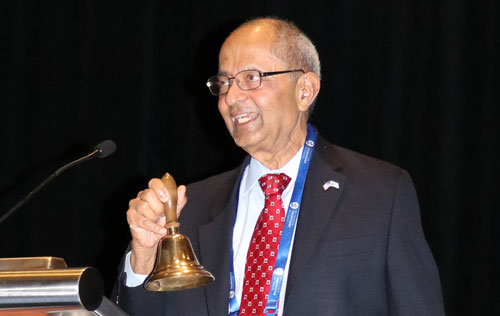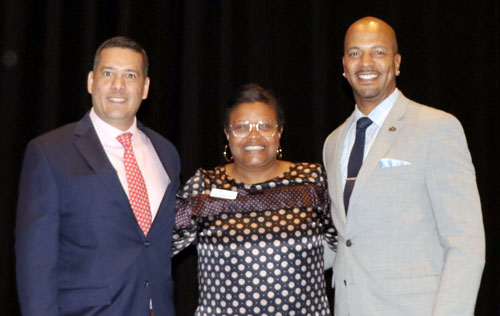Held in Baltimore on September 26-28, MHSC kicked off with a plenary session on “Lifestyle Medicine in Community Mental Health,” presented by APA President Ramaswamy Viswanathan, M.D., Dr.Med.Sc. He was followed by a cross-disciplinary CEO panel hosted by APA CEO and Medical Director Marketa Wills, M.D., M.B.A. “That theme of lifestyle medicine and lifestyle psychiatry is critically important and really is the vision of our organization,” Wills said. “We want to promote universal and equitable access to all, while also promoting top-notch evidence-based education and research and moving the profession forward.”
Mental and Physical Health
Viswanathan has made “Lifestyle for Positive Mental and Physical Health” the overarching theme of his term as APA president, and during his presentation he shared his personal connection to the topic. His father died of a heart attack at age 42, when was just 2; one of his father’s brothers died at 35, another at 55.
One of Viswanathan’s great regrets is that he has no memories of his father. “I didn’t want that to happen to my own children,” he said.
Viswanathan used his plenary session to provide an overview of evidence-based strategies for incorporating lifestyle interventions into community mental health. Among the connections he shared:
•
Drinking black coffee enhances neurocognition.
•
Exercise stimulates hippocampal plasticity.
•
Running can be as effective as escitalopram in treating moderate depression.
•
Diet can reduce chronic inflammation, which is associated with depression.
Viswanathan also pointed out that 90% of the body’s serotonin receptors are found in the gut—a biological reminder of the close relationship between lifestyle and mental health. It is also a relationship that runs in both directions. “People with psychiatric illness have poorer physical health and earlier mortality,” Viswanathan said. “We have to promote both their physical and mental health. Lifestyle medicine achieves both.”
Three Professions, One Goal
Wills took a similarly inclusive approach with her CEO Summit, for which she was joined onstage by Guillermo Corea, M.B.A., chief business innovation and growth officer for the American Psychological Association, and Anthony Estreet, Ph.D., M.B.A., L.C.S.W.-C., CEO of the National Association of Social Workers. Together, they offered an interdisciplinary vision for supporting community mental health care.
Wills began by sharing APA’s roadmap for the future of psychiatry, which has three components:
•
Patient and public facing: This includes promoting health equity among all patient populations, working to eradicate the stigma around mental health care, tailoring information for Spanish-language communities, and conducting public opinion polling.
•
Professional facing: This includes advocating for federal and state funding of behavioral health treatments and growing the number of graduate medical education slots for psychiatry residents.
•
Policy and implementation facing: This includes continuing to advocate for mental health parity, shifting mental health care from clinical settings into the community, supporting the collaborative care model, reimagining the DSM, and developing quality measures.
“We’re bringing research, education, policy, quality measurement—all of that—together in order that we create a system where all can thrive and lead their most healthy lives,” Wills said.
In discussing the future of psychology, Corea focused on three trends that will shape the delivery of mental health services: technology integration, including artificial intelligence and virtual reality; neuroscience advancements, including brain mapping and biomarkers; and cultural and societal shifts, including a greater focus on DEI and a growing awareness of mental health needs globally.
“The demand for mental health services is only growing, and it’s going to continue to grow,” Corea said. “And we’re going to need innovative solutions to ensure that care is accessible to all.”
Echoing both Wills and Corea, Estreet outlined NASW’s three priorities: the public, educating people about what social workers do; the profession, making sure that social work has a brand that people recognize; and policy, advocating on behalf of the profession to increase reimbursement rates and remove barriers to care.
“This is all about collaboration, collaboration, collaboration,” Estreet said. “It’s great to see so many people come together at this conference and, in an interdisciplinary way, talk about how we can use our skills to really impact the mental health space.” ■


